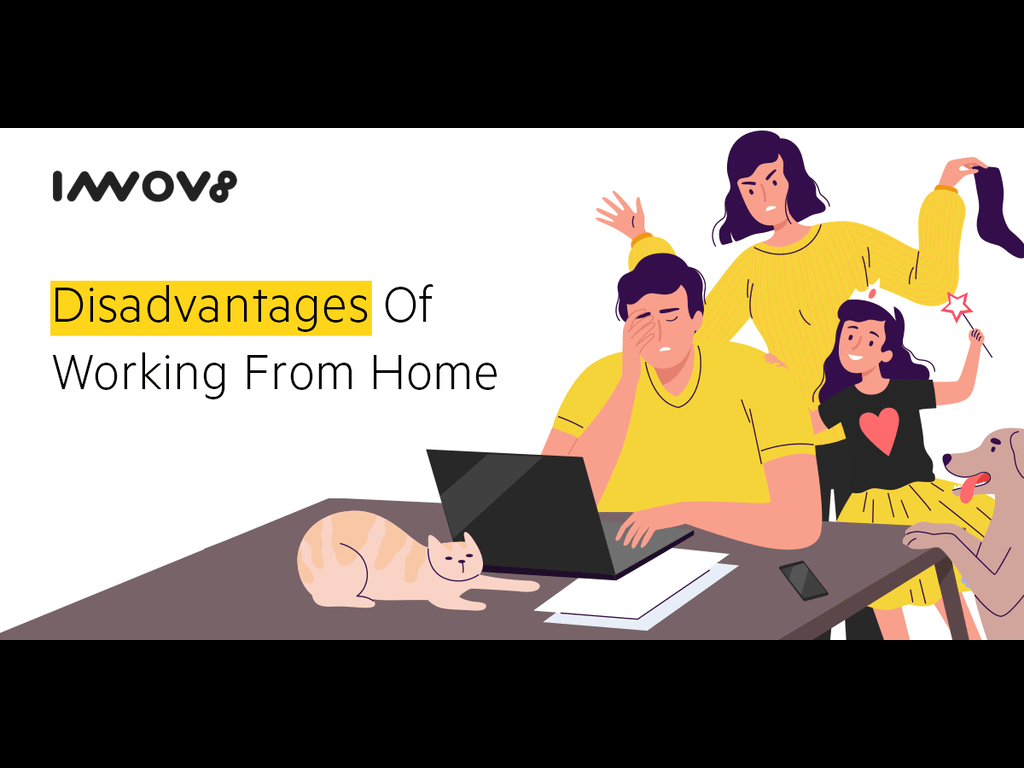In recent times, technological trends have given rise to remote work. According to Statista, the share of employees opting to work from home globally has increased sequentially, from 22% in 2020 to 28% in 2023.
You may be inclined towards remote work owing to its ease of access and the option to do away with a daily commute and socialisation. However, there are certain disadvantages of working from home, too.
These downsides can be multifaceted, ranging from lack of concentration and isolation to zero work-life balance. Understanding such pitfalls can help you and your organisation mitigate these risks effectively.
10 Disadvantages of Working from Home
The following sections mention the top 10 disadvantages of working from home.
1. Lack of Work-life Balance
A challenge associated with working from home is drawing clear boundaries between your work and personal life. With time, it can get difficult for you to tell the difference between working from home and reporting for work.
Employees who feel this lack of separation often put in longer hours because they find it harder to “switch off” from work mode.
Work can bleed into leisure time when there isn’t a distinct physical transition from the office to the home. This can lead to burnout and decreased job satisfaction.
The fact that roommates or family don’t always understand or respect work boundaries can make striking this balance even more challenging.
2. Inability to Unplug
Many people find the expensive and time-consuming commute to work to be unappealing. The advantage of commuting is that it makes the line between your home and workplace environments distinct.
Even though many office workers still check in from home occasionally, people who work from home in particular are always “logged in” or online.

3. Lack of Social Life
Another pressing disadvantage of working from home is the fall in social interactions among an increasing number of employees. Working remotely for extended hours can result in you not participating in social events.
When you work from home, you don’t have the option to attend unplanned team meetings, casual chats, or coffee breaks with your colleagues. This brings in a sense of isolation and can have a negative effect on your mental health.
4. Reduced Motivation
Employee motivation enables them to persevere and achieve their goals. However, it can be simple to lose motivation quickly in the wrong circumstances, which can lead to the possibility of not achieving the desired business outcomes.
Having a pep talk with a senior colleague or working in an office with colleagues who have similar goals and purposes can both significantly increase external motivation. However, working from home does not offer that kind of environment.
Your life might be challenging, and if you are not motivated enough, your overall professional output might suffer. Although self-motivation has its uses, it might not be enough to keep a person going all the time. This is when the use of external motivation starts to make sense.
5. Risks Pertaining to Online Security
Working from home can have significant security risks and data privacy issues, which adds to the list of drawbacks. Remote work also often utilises personal devices and internet connections, which may not be as secure as corporate networks.
This raises the risk of data breaches and cyberattacks. Employees handling sensitive data are more at risk since it can be more challenging to handle secure document storage and disposal in a home setting, adding to the disadvantages of working from home.
Another factor to note here is that using business and personal devices simultaneously can complicate data privacy management. Thus, it is crucial for companies to provide remote workers with strong security software and enforce strict cybersecurity policies.
In other words, note that it is your employer’s duty to give you the necessary system and training. Additionally, it is your duty to follow the security rules and conduct safe searches when you are on the internet.
6. Lack of Equipment/Technology
Not having the required technology at home to work is another disadvantage of working from home. It might also get affected due to unstable Wi-Fi connection or due to standard technological issues.
According to the FlexJobs survey, 28% of people said they faced problems with technology. Another 26% said they had doubts about working/stable Wi-Fi connections. While technical problems do occasionally occur in offices, they are usually easier to fix since a designated support team is there for such issues.
It’s worthwhile to request improved equipment from the employer. If you frequently work from home, you need to invest in top-notch technology. You can also consider working remotely along with a tech support team that can often work, even though it’s not always as efficient as face-to-face communication. However, note that it also comes with a price tag.

7. Limitations in Career Growth
In addition to the above-mentioned disadvantages of working from home, remote workers may also encounter obstacles to career advancement, as they have less visibility around the office. When it comes to high-profile projects or promotions, it’s common for being out of sight to just be forgotten.
Professional development can also be hampered by casual networking opportunities. Employees may fail to see the value of mentorship, skill development, and forming relationships—all of which are necessary for career advancement. Employers need to create career development pathways for remote workers in order to lessen these disadvantages.
8. Difficulty in Bonding with Colleagues
In some circumstances, in-person interaction still works better than online communication tools and collaborative capabilities that technology has to offer. People sitting around a table looking at drawings could be able to solve any problem in a minute with online collaboration tools that would have taken days to resolve otherwise.
Moreover, developing relationships with colleagues and having delicate talks in person can be far simpler than doing so via video chat. It’s easier to step on each other’s words or misread cues when speaking electronically.
9. Limitations in Supervision and Management
When employees in an organisation decide to work remote, it becomes even more challenging for managers. This is because the resources to monitor employee performance in a remote setting are scarce and often not available.
This may lead to a lack of accountability and inefficiencies, becoming another disadvantage of working from home. Furthermore, when working remotely, it could be difficult to identify and address issues like burnout or employee disengagement.
Effective remote management requires new skills and strategies like trust-building, clear communication, and using digital tools to monitor performance.
10. Decreased Productivity
Experts in the field think that working remotely boosts output. It is difficult to focus and sustain a long-term interest in work, though, despite the alluring distraction of midday naps, the web series that ended on a cliffhanger, time spent with family, etc.
Working remotely certainly has its advantages. However, one cannot ignore the various disadvantages of working from home, which can lead to feelings of isolation and low motivation, hindering productive work. Thus, you should weigh the decision to work from home extremely carefully and understand the pros and cons before making this career shift.


